Unit 10 You're supposed to shake hands.单元闯关双测卷(测基础)(含解析)
文档属性
| 名称 | Unit 10 You're supposed to shake hands.单元闯关双测卷(测基础)(含解析) | 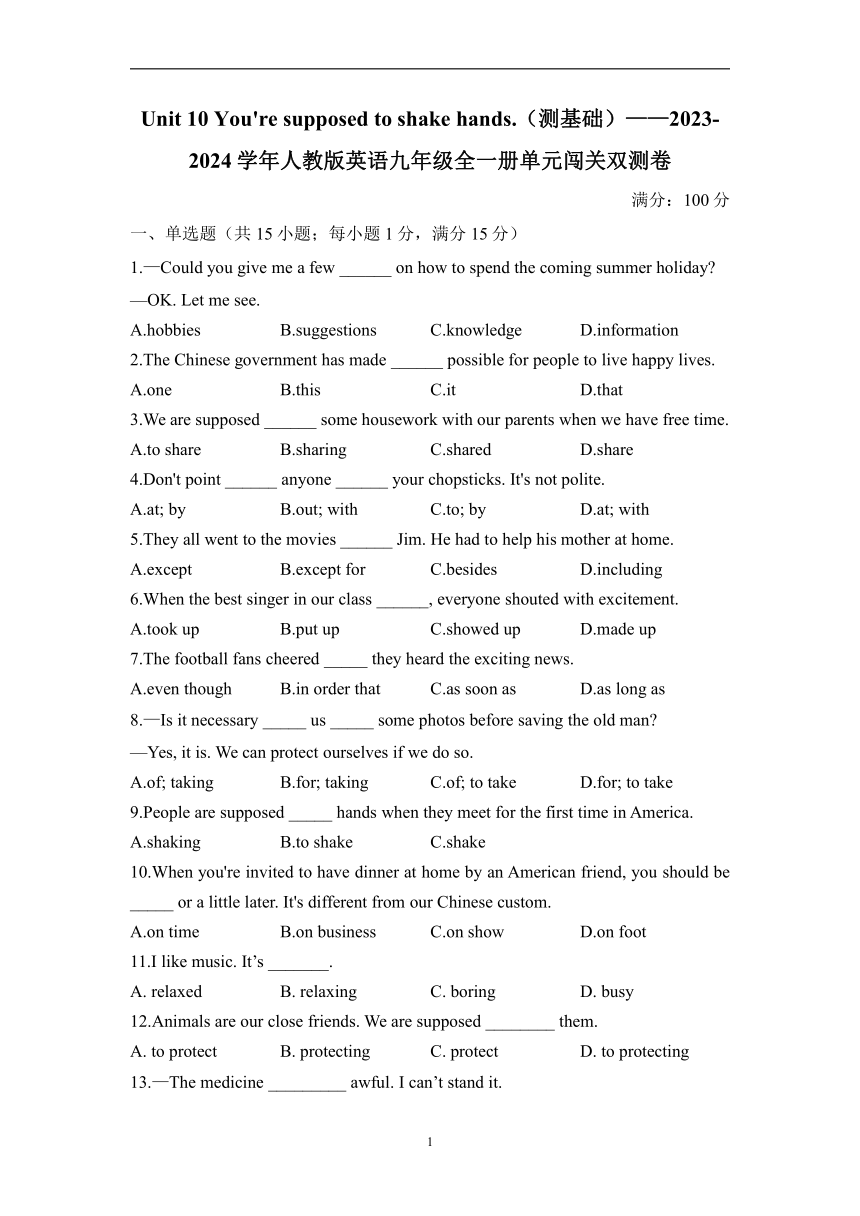 | |
| 格式 | docx | ||
| 文件大小 | 165.5KB | ||
| 资源类型 | 教案 | ||
| 版本资源 | 人教新目标(Go for it)版 | ||
| 科目 | 英语 | ||
| 更新时间 | 2023-09-20 16:06:30 | ||
图片预览

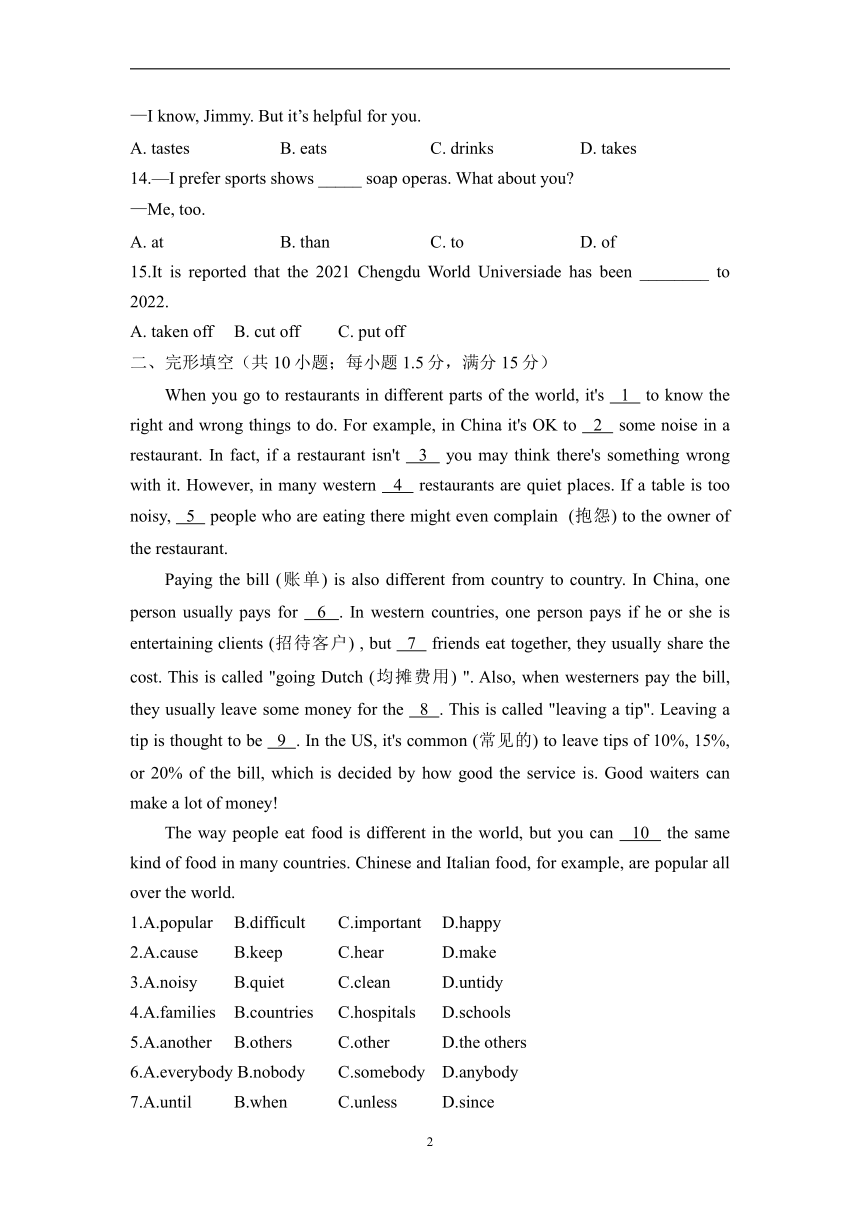
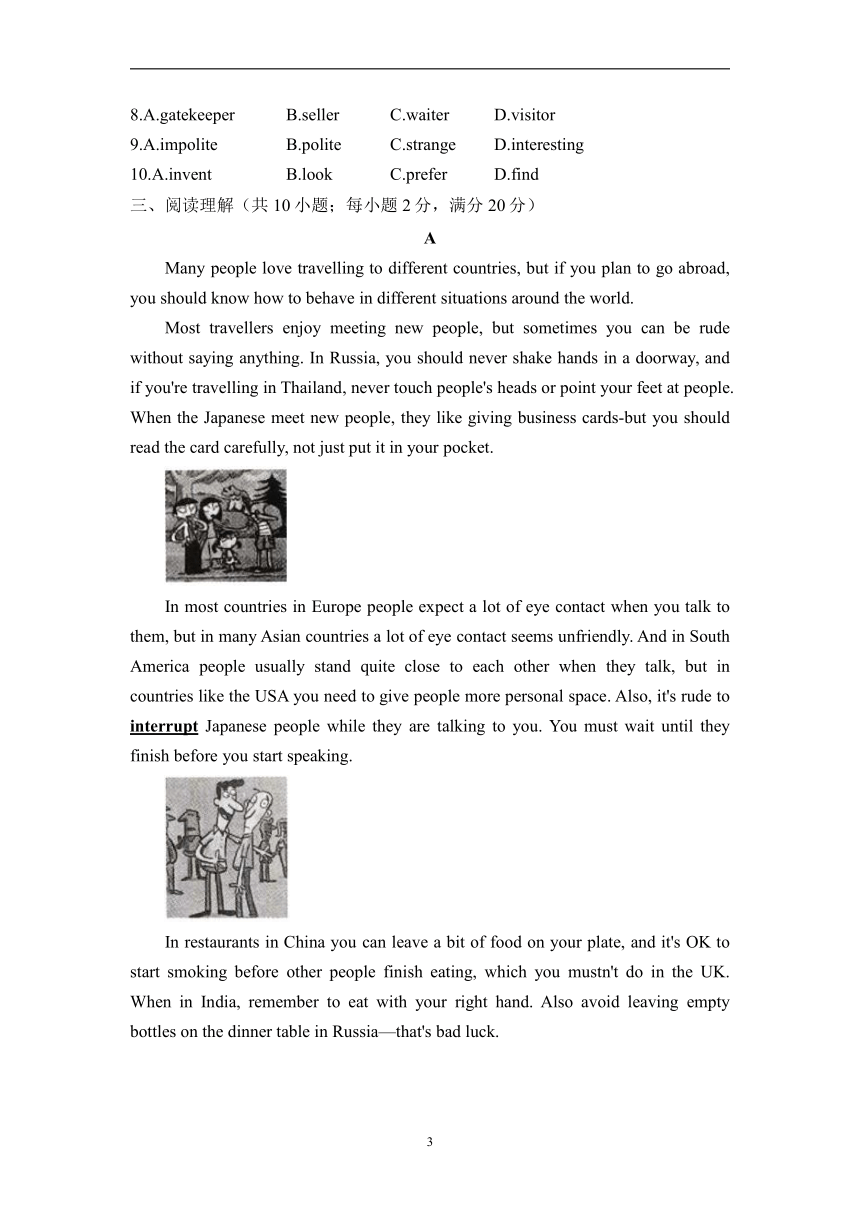
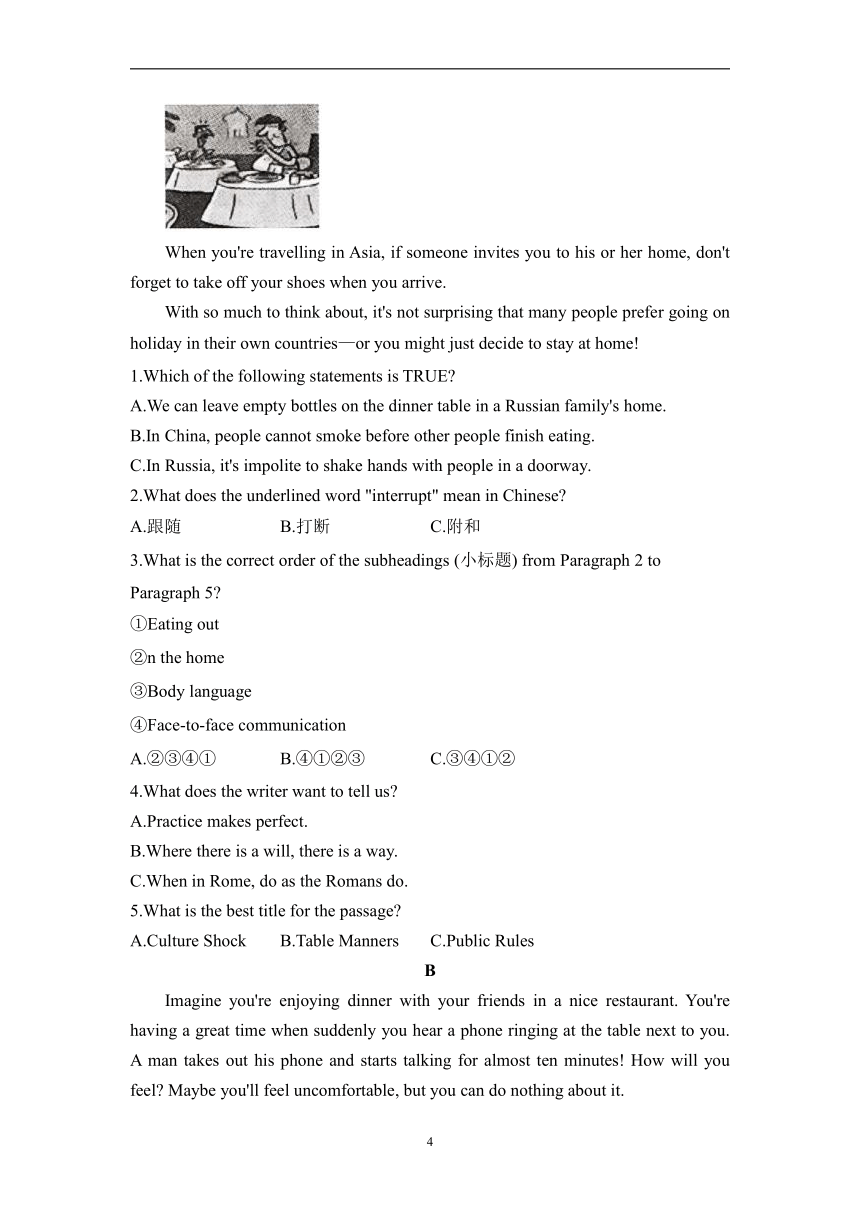
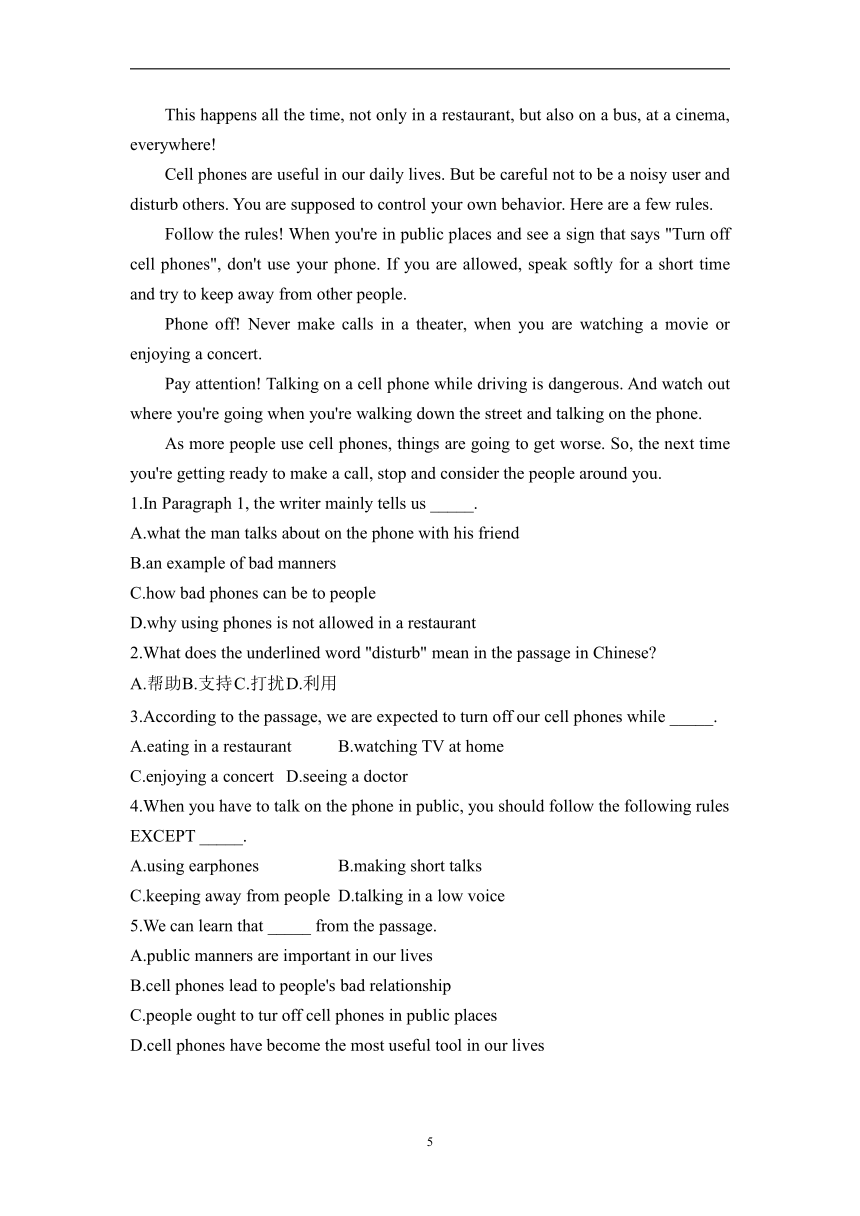
文档简介
Unit 10 You're supposed to shake hands.(测基础)——2023-2024学年人教版英语九年级全一册单元闯关双测卷
满分:100分
一、单选题(共15小题;每小题1分,满分15分)
1.—Could you give me a few ______ on how to spend the coming summer holiday
—OK. Let me see.
A.hobbies B.suggestions C.knowledge D.information
2.The Chinese government has made ______ possible for people to live happy lives.
A.one B.this C.it D.that
3.We are supposed ______ some housework with our parents when we have free time.
A.to share B.sharing C.shared D.share
4.Don't point ______ anyone ______ your chopsticks. It's not polite.
A.at; by B.out; with C.to; by D.at; with
5.They all went to the movies ______ Jim. He had to help his mother at home.
A.except B.except for C.besides D.including
6.When the best singer in our class ______, everyone shouted with excitement.
A.took up B.put up C.showed up D.made up
7.The football fans cheered _____ they heard the exciting news.
A.even though B.in order that C.as soon as D.as long as
8.—Is it necessary _____ us _____ some photos before saving the old man
—Yes, it is. We can protect ourselves if we do so.
A.of; taking B.for; taking C.of; to take D.for; to take
9.People are supposed _____ hands when they meet for the first time in America.
A.shaking B.to shake C.shake
10.When you're invited to have dinner at home by an American friend, you should be _____ or a little later. It's different from our Chinese custom.
A.on time B.on business C.on show D.on foot
11.I like music. It’s _______.
A. relaxed B. relaxing C. boring D. busy
12.Animals are our close friends. We are supposed ________ them.
A. to protect B. protecting C. protect D. to protecting
13.—The medicine _________ awful. I can’t stand it.
—I know, Jimmy. But it’s helpful for you.
A. tastes B. eats C. drinks D. takes
14.—I prefer sports shows _____ soap operas. What about you
—Me, too.
A. at B. than C. to D. of
15.It is reported that the 2021 Chengdu World Universiade has been ________ to 2022.
A. taken off B. cut off C. put off
二、完形填空(共10小题;每小题1.5分,满分15分)
When you go to restaurants in different parts of the world, it's 1 to know the right and wrong things to do. For example, in China it's OK to 2 some noise in a restaurant. In fact, if a restaurant isn't 3 you may think there's something wrong with it. However, in many western 4 restaurants are quiet places. If a table is too noisy, 5 people who are eating there might even complain (抱怨) to the owner of the restaurant.
Paying the bill (账单) is also different from country to country. In China, one person usually pays for 6 . In western countries, one person pays if he or she is entertaining clients (招待客户) , but 7 friends eat together, they usually share the cost. This is called "going Dutch (均摊费用) ". Also, when westerners pay the bill, they usually leave some money for the 8 . This is called "leaving a tip". Leaving a tip is thought to be 9 . In the US, it's common (常见的) to leave tips of 10%, 15%, or 20% of the bill, which is decided by how good the service is. Good waiters can make a lot of money!
The way people eat food is different in the world, but you can 10 the same kind of food in many countries. Chinese and Italian food, for example, are popular all over the world.
1.A.popular B.difficult C.important D.happy
2.A.cause B.keep C.hear D.make
3.A.noisy B.quiet C.clean D.untidy
4.A.families B.countries C.hospitals D.schools
5.A.another B.others C.other D.the others
6.A.everybody B.nobody C.somebody D.anybody
7.A.until B.when C.unless D.since
8.A.gatekeeper B.seller C.waiter D.visitor
9.A.impolite B.polite C.strange D.interesting
10.A.invent B.look C.prefer D.find
三、阅读理解(共10小题;每小题2分,满分20分)
A
Many people love travelling to different countries, but if you plan to go abroad, you should know how to behave in different situations around the world.
Most travellers enjoy meeting new people, but sometimes you can be rude without saying anything. In Russia, you should never shake hands in a doorway, and if you're travelling in Thailand, never touch people's heads or point your feet at people. When the Japanese meet new people, they like giving business cards-but you should read the card carefully, not just put it in your pocket.
In most countries in Europe people expect a lot of eye contact when you talk to them, but in many Asian countries a lot of eye contact seems unfriendly. And in South America people usually stand quite close to each other when they talk, but in countries like the USA you need to give people more personal space. Also, it's rude to interrupt Japanese people while they are talking to you. You must wait until they finish before you start speaking.
In restaurants in China you can leave a bit of food on your plate, and it's OK to start smoking before other people finish eating, which you mustn't do in the UK. When in India, remember to eat with your right hand. Also avoid leaving empty bottles on the dinner table in Russia—that's bad luck.
When you're travelling in Asia, if someone invites you to his or her home, don't forget to take off your shoes when you arrive.
With so much to think about, it's not surprising that many people prefer going on holiday in their own countries—or you might just decide to stay at home!
1.Which of the following statements is TRUE
A.We can leave empty bottles on the dinner table in a Russian family's home.
B.In China, people cannot smoke before other people finish eating.
C.In Russia, it's impolite to shake hands with people in a doorway.
2.What does the underlined word "interrupt" mean in Chinese
A.跟随 B.打断 C.附和
3.What is the correct order of the subheadings (小标题) from Paragraph 2 to Paragraph 5
①Eating out
②n the home
③Body language
④Face-to-face communication
A.②③④① B.④①②③ C.③④①②
4.What does the writer want to tell us
A.Practice makes perfect.
B.Where there is a will, there is a way.
C.When in Rome, do as the Romans do.
5.What is the best title for the passage
A.Culture Shock B.Table Manners C.Public Rules
B
Imagine you're enjoying dinner with your friends in a nice restaurant. You're having a great time when suddenly you hear a phone ringing at the table next to you. A man takes out his phone and starts talking for almost ten minutes! How will you feel Maybe you'll feel uncomfortable, but you can do nothing about it.
This happens all the time, not only in a restaurant, but also on a bus, at a cinema, everywhere!
Cell phones are useful in our daily lives. But be careful not to be a noisy user and disturb others. You are supposed to control your own behavior. Here are a few rules.
Follow the rules! When you're in public places and see a sign that says "Turn off cell phones", don't use your phone. If you are allowed, speak softly for a short time and try to keep away from other people.
Phone off! Never make calls in a theater, when you are watching a movie or enjoying a concert.
Pay attention! Talking on a cell phone while driving is dangerous. And watch out where you're going when you're walking down the street and talking on the phone.
As more people use cell phones, things are going to get worse. So, the next time you're getting ready to make a call, stop and consider the people around you.
1.In Paragraph 1, the writer mainly tells us _____.
A.what the man talks about on the phone with his friend
B.an example of bad manners
C.how bad phones can be to people
D.why using phones is not allowed in a restaurant
2.What does the underlined word "disturb" mean in the passage in Chinese
A.帮助 B.支持 C.打扰 D.利用
3.According to the passage, we are expected to turn off our cell phones while _____.
A.eating in a restaurant B.watching TV at home
C.enjoying a concert D.seeing a doctor
4.When you have to talk on the phone in public, you should follow the following rules EXCEPT _____.
A.using earphones B.making short talks
C.keeping away from people D.talking in a low voice
5.We can learn that _____ from the passage.
A.public manners are important in our lives
B.cell phones lead to people's bad relationship
C.people ought to tur off cell phones in public places
D.cell phones have become the most useful tool in our lives
四、用方框中所给单词的适当形式填空(每词限用一次)(共5小题;每小题2分,满分10分)
meet, sit, exchange, solve, different
1.I look forward to _____ my favorite scientist —Tu Youyou.
2.Would you like my old TV in _____ for this camera
3.It's very comfortable _____ on the sofa.
4.Chinese and Americans behave _____ when having dinner.
5.My brother is very glad to know how _____ the problem.
五、词汇互译。(共5小题;每小题1分,满分5分)
1.Drums are ______(基础的)to African music. People there play them often.
2.Mr. Smith _____(亲吻)his wife and kids before he goes to work every day.
3.Yongshu Island is the farthest island off the _____(海岸)of the southern part of China.
4.Some classical pieces at the concert are traditional and have a lasting _____(价值).
5.When you _____(greet)someone, usually you can say "Hello" or shake hands with him.
六、根据情境使补全对话,每空词数不限。(共5小题;每小题2分,满分10分)
A.What are people expected to do when they meet for the first time
B.Do you mean when people meet for the first time C.And in Korea we also bow. D.There are different customs in different countries. E.What about in Mexico F.Where are you from G.How are the people there
A: What are people supposed to do when they meet in your country
B: ① .
A: Yeah.
B: Well, in Brazil, friends kiss.
A: ② .
C: We shake hands.
A: How about in Japan ③ .
D: We bow.
E: ④ .
A: Well,I guess in most countries people shake hands. ⑤ Isn't that interesting
七、书面表达(共1小题;满分25分)
假如你是李军,你在美国的笔友Tom要来中国玩,他来信询问你关于中国的餐桌礼仪方面的事情。请你给他回一封信,介绍一下中国的餐桌礼仪。 要求: 1.80词左右,开头和结尾已给出,不计入总词数; 2.不能使用真实姓名和地名。
Dear Tom,
I'm going to tell you something about the table manners in China.
_______________________________________________________________________________________________________________________________________________________________________________________________________________
答案以及解析
一、
1.答案:B
解析:—你能给我一些关于怎样度过即将到来的暑假的建议吗?一好的。让我想想。a few修饰可数名词复数形式,排除C和D选项,根据句意可知,此处应填suggestions。
2.答案:C
解析:句意:中国政府已经使让人们过上幸福生活成为可能。it在此处为形式宾语,真正的宾语是后面的动词不定式。
3.答案:A
解析:be supposed to do sth.意为"应该做某事",为固定搭配。
4.答案:D
解析:句意:不要用你的筷子指着任何人。这是不礼貌的。point to/at sb.“指着某人”;表示"用筷子"时,介词用with。
5.答案:A
解析:句意:除了吉姆他们都去看电影了。他不得不在家帮他的妈妈。根据后面的句子"他不得不在家帮他的妈妈"可知,他没有去看电影。故选A。
6.答案:C
解析:句意:当我们班上最好的歌手出现时,每个人都兴奋地喊叫起来。take up意为"占据";put up意为"张贴,搭建";show up 意为"出现,露面";make up意为"编造"。
7.答案:C
解析:句意:足球迷们一听到这个令人兴奋的消息就欢呼起来。even though"虽然";in order that"为了";as soon as"一……就……";as long as"只要"。
8.答案:D
解析:在"It is +adj.+ of sb.+ to do sth."结构中,形容词用来说明of后的人的品质特征;在"It is +adj.+ for sb.+ to do sth."结构中,形容词用来表示事物的特点。
9.答案:B
解析:句意:在美国人们第一次见面时应该握手。be supposed to do sth. "应该做某事"。
10.答案:A
解析:on time"按时";on business"出差";on show"展览中";on foot"步行"。此处表示“当你受邀去一位美国朋友家里吃晚饭的时候,你应该按时或者稍微晚一点儿到”,故答案为A。
11.答案:B
解析:relaxed指感到轻松的,形容人,relaxing形容物,意思是令人轻松的。因为题目中我是喜欢音乐的,所以不会觉得它无聊,故排除C,D意思是繁忙的,与题意无关。故答案是B。
12.答案:A
解析:句意:动物是我们亲密的朋友。我们应该保护它们。be supposed to do sth.应该做某事,故为to protect。故选A。
13.答案:A
解析:本题主要考查动词。A项,taste“尝起来”。B项,eat“吃”。C项,drink“喝”。D项,take“带走”。结合句意,这药尝起来太苦了。故taste符合题意。且主语是单数,所以谓语用第三人称单数形式tastes。故正确答案为A。
14.答案:C
解析:本题考查固定词组搭配。prefer sth.to sth.意为“比起……更喜欢……”,为固定词组搭配。句意:比起肥皂剧,我更喜欢看运动比赛。你呢 我也是。故选C。
15.答案:C
解析:考查动词短语。taken off起飞:cut off切掉;put off推迟。根据“2021 Chengdu World Universiade has been...to 2022”可知,2021年运动会推迟到2022年。故选C。
二、
答案:1-5 CDABC 6-10 ABCBD
1.答案:C
解析:当你去世界不同地方的餐馆时,知道正确和错误的事情是很重要的。popular"流行的";difficult"困难的";important"重要的";happy"高兴的"。根据语境可知应用important。
2.答案:D
解析:make some noise"发出噪声"是固定短语。
3.答案:A
解析:事实上,如果一家餐馆不吵,你可能会觉得有什么不对劲。根据上文中的"in China it's OK to _____ some noise in a restaurant"可知选 A。
4.答案:B
解析:然而,在许多西方国家,餐馆是安静的地方。
5.答案:C
解析:another"再一,又一",表泛指,后接单数名词;others"其他的人或物",相当于"other+复数名词";other"其他的",表示泛指,后接复数名词;the others"其他的人或物",表示特指,相当于"the other +复数名词"。空处修饰 people,表泛指,应用other。
6.答案:A
解析:在中国,一个人通常为每个人付钱。根据语境和中国文化可知,everybody符合文意。
7.答案:B
解析:在西方国家,如果一个人招待客户时,他或她会付钱,但是当朋友们一起吃饭时,他们通常会分摊费用,故所缺的词是 when。
8.答案:C
解析:另外,当西方人付账时,他们通常会给服务员留下一些钱。gatekeeper"看门人";seller"销售者";waiter"服务员";visitor"访问者"。根据语境和西方文化可知选C。
9.答案:B
解析:留下小费被认为是有礼貌的,故所缺的词是polite。
10.答案:D
解析:在世界上人们吃食物的方式是不同的,但在许多国家你能找到同样的食物,故所缺的词是find。
A
答案:CBCCA
1.答案:C
解析:细节理解题。根据第二段中的"In Russia, you should never shake hands in a doorway"可知,选项C是正确的描述。
2.答案:B
解析:词义猜测题。结合上下文可知,在日本,别人和你说话的时候,"打断"他们是不礼貌的。
3.答案:C
解析:段落大意题。通读第二段到第五段的内容可知,第二段的小标题是"身体语言";第三段的小标题是"面对面交流";第四段的小标题是"出去吃饭";第五段的小标题是"在家里",故对应的顺序是C项。
4.答案:C
解析:推理判断题。通读全文可知,作者想要告诉我们:要入乡随俗。故答案为C。
5.答案:A
解析:标题判断题。本文是关于一些国家的礼仪和文化的介绍,故最佳标题是A项。
B
答案:BCCAA
1.答案:B
解析:推理判断题。文章第一段主要描述了一个让人感觉很不舒服的场景。这是作者给出的一个关于没礼貌的行为的例子,故选B。
2.答案:C
解析:词义猜测题。由第三段第二句中的"be careful not to be a noisy user"可推知,disturb表示"打扰"。
3.答案:C
解析:细节理解题。由短文的倒数第三段可知,当我们在看电影或欣赏音乐会的时候应关掉手机。
4.答案:A
解析:细节理解题。由短文第四段的最后一句可知,如果你被允许(打电话),你可以小点儿声,通话时间短一些,到离他人远的地方通话,而A项内容文中未提及。
5.答案:A
解析:推理判断题。通读全文可知,文章主要介绍了在公共场合使用手机的一些规则,属于社交礼仪的范畴,所以我们可以从文中了解到公共礼仪对人们的生活很重要,因此A项正确。
四、
答案:1. meeting2. exchange 3. to sit4. differently5. to solve
解析:1.句意:我期待见到我最喜欢的科学家—屠呦呦。look forward to doing sth."期待做某事",为固定搭配。 2.句意:用我的旧电视机换这架照相机,你愿意吗?in exchange for..."用……交换",为固定搭配。 3.句意:坐在这个沙发上非常舒服。空处用动词不定式作真正的主语。 4.句意:中国人和美国人在用餐时表现不同。修饰动词behave 应用副词differently。 5.句意:我弟弟知道如何解决这个问题了,他非常高兴。
五、
1.答案:basic
解析:句意:对于非洲音乐来说,鼓是基础的(乐器)。那里的人们经常打鼓。
2.答案:kisses
解析:根据句中的时间状语可知空处所填动词应是一般现在时,又因为主语是Mr. Smith,故填kisses。
3.答案:coast
解析:句意:永暑岛是离中国南部海岸最远的岛屿。根据句意应填coast"海岸"。
4.答案:value
解析:句意:音乐会上一些经典曲目是传统的并且有长久的价值。value"价值",符合句意。
5.答案:greet
解析:句意:当你跟某人打招呼的时候,你通常可以说“你好”或和他握手。
六、答案:BEACD
七、答案:
Dear Tom,
I'm going to tell you something about the table manners in China.
You can make a toast at the beginning of the dinner. You are not supposed to stick your chopsticks into your food. You shouldn't point at anyone with your chopsticks. And it's rude to speak loudly at table. I think it's good to wipe your mouth with the napkin after you take a drink. And it's polite to thank the hostess for the food.
I hope the above points can help you, and I hope you will have a great time in China.
Best wishes,
Li Jun
2
满分:100分
一、单选题(共15小题;每小题1分,满分15分)
1.—Could you give me a few ______ on how to spend the coming summer holiday
—OK. Let me see.
A.hobbies B.suggestions C.knowledge D.information
2.The Chinese government has made ______ possible for people to live happy lives.
A.one B.this C.it D.that
3.We are supposed ______ some housework with our parents when we have free time.
A.to share B.sharing C.shared D.share
4.Don't point ______ anyone ______ your chopsticks. It's not polite.
A.at; by B.out; with C.to; by D.at; with
5.They all went to the movies ______ Jim. He had to help his mother at home.
A.except B.except for C.besides D.including
6.When the best singer in our class ______, everyone shouted with excitement.
A.took up B.put up C.showed up D.made up
7.The football fans cheered _____ they heard the exciting news.
A.even though B.in order that C.as soon as D.as long as
8.—Is it necessary _____ us _____ some photos before saving the old man
—Yes, it is. We can protect ourselves if we do so.
A.of; taking B.for; taking C.of; to take D.for; to take
9.People are supposed _____ hands when they meet for the first time in America.
A.shaking B.to shake C.shake
10.When you're invited to have dinner at home by an American friend, you should be _____ or a little later. It's different from our Chinese custom.
A.on time B.on business C.on show D.on foot
11.I like music. It’s _______.
A. relaxed B. relaxing C. boring D. busy
12.Animals are our close friends. We are supposed ________ them.
A. to protect B. protecting C. protect D. to protecting
13.—The medicine _________ awful. I can’t stand it.
—I know, Jimmy. But it’s helpful for you.
A. tastes B. eats C. drinks D. takes
14.—I prefer sports shows _____ soap operas. What about you
—Me, too.
A. at B. than C. to D. of
15.It is reported that the 2021 Chengdu World Universiade has been ________ to 2022.
A. taken off B. cut off C. put off
二、完形填空(共10小题;每小题1.5分,满分15分)
When you go to restaurants in different parts of the world, it's 1 to know the right and wrong things to do. For example, in China it's OK to 2 some noise in a restaurant. In fact, if a restaurant isn't 3 you may think there's something wrong with it. However, in many western 4 restaurants are quiet places. If a table is too noisy, 5 people who are eating there might even complain (抱怨) to the owner of the restaurant.
Paying the bill (账单) is also different from country to country. In China, one person usually pays for 6 . In western countries, one person pays if he or she is entertaining clients (招待客户) , but 7 friends eat together, they usually share the cost. This is called "going Dutch (均摊费用) ". Also, when westerners pay the bill, they usually leave some money for the 8 . This is called "leaving a tip". Leaving a tip is thought to be 9 . In the US, it's common (常见的) to leave tips of 10%, 15%, or 20% of the bill, which is decided by how good the service is. Good waiters can make a lot of money!
The way people eat food is different in the world, but you can 10 the same kind of food in many countries. Chinese and Italian food, for example, are popular all over the world.
1.A.popular B.difficult C.important D.happy
2.A.cause B.keep C.hear D.make
3.A.noisy B.quiet C.clean D.untidy
4.A.families B.countries C.hospitals D.schools
5.A.another B.others C.other D.the others
6.A.everybody B.nobody C.somebody D.anybody
7.A.until B.when C.unless D.since
8.A.gatekeeper B.seller C.waiter D.visitor
9.A.impolite B.polite C.strange D.interesting
10.A.invent B.look C.prefer D.find
三、阅读理解(共10小题;每小题2分,满分20分)
A
Many people love travelling to different countries, but if you plan to go abroad, you should know how to behave in different situations around the world.
Most travellers enjoy meeting new people, but sometimes you can be rude without saying anything. In Russia, you should never shake hands in a doorway, and if you're travelling in Thailand, never touch people's heads or point your feet at people. When the Japanese meet new people, they like giving business cards-but you should read the card carefully, not just put it in your pocket.
In most countries in Europe people expect a lot of eye contact when you talk to them, but in many Asian countries a lot of eye contact seems unfriendly. And in South America people usually stand quite close to each other when they talk, but in countries like the USA you need to give people more personal space. Also, it's rude to interrupt Japanese people while they are talking to you. You must wait until they finish before you start speaking.
In restaurants in China you can leave a bit of food on your plate, and it's OK to start smoking before other people finish eating, which you mustn't do in the UK. When in India, remember to eat with your right hand. Also avoid leaving empty bottles on the dinner table in Russia—that's bad luck.
When you're travelling in Asia, if someone invites you to his or her home, don't forget to take off your shoes when you arrive.
With so much to think about, it's not surprising that many people prefer going on holiday in their own countries—or you might just decide to stay at home!
1.Which of the following statements is TRUE
A.We can leave empty bottles on the dinner table in a Russian family's home.
B.In China, people cannot smoke before other people finish eating.
C.In Russia, it's impolite to shake hands with people in a doorway.
2.What does the underlined word "interrupt" mean in Chinese
A.跟随 B.打断 C.附和
3.What is the correct order of the subheadings (小标题) from Paragraph 2 to Paragraph 5
①Eating out
②n the home
③Body language
④Face-to-face communication
A.②③④① B.④①②③ C.③④①②
4.What does the writer want to tell us
A.Practice makes perfect.
B.Where there is a will, there is a way.
C.When in Rome, do as the Romans do.
5.What is the best title for the passage
A.Culture Shock B.Table Manners C.Public Rules
B
Imagine you're enjoying dinner with your friends in a nice restaurant. You're having a great time when suddenly you hear a phone ringing at the table next to you. A man takes out his phone and starts talking for almost ten minutes! How will you feel Maybe you'll feel uncomfortable, but you can do nothing about it.
This happens all the time, not only in a restaurant, but also on a bus, at a cinema, everywhere!
Cell phones are useful in our daily lives. But be careful not to be a noisy user and disturb others. You are supposed to control your own behavior. Here are a few rules.
Follow the rules! When you're in public places and see a sign that says "Turn off cell phones", don't use your phone. If you are allowed, speak softly for a short time and try to keep away from other people.
Phone off! Never make calls in a theater, when you are watching a movie or enjoying a concert.
Pay attention! Talking on a cell phone while driving is dangerous. And watch out where you're going when you're walking down the street and talking on the phone.
As more people use cell phones, things are going to get worse. So, the next time you're getting ready to make a call, stop and consider the people around you.
1.In Paragraph 1, the writer mainly tells us _____.
A.what the man talks about on the phone with his friend
B.an example of bad manners
C.how bad phones can be to people
D.why using phones is not allowed in a restaurant
2.What does the underlined word "disturb" mean in the passage in Chinese
A.帮助 B.支持 C.打扰 D.利用
3.According to the passage, we are expected to turn off our cell phones while _____.
A.eating in a restaurant B.watching TV at home
C.enjoying a concert D.seeing a doctor
4.When you have to talk on the phone in public, you should follow the following rules EXCEPT _____.
A.using earphones B.making short talks
C.keeping away from people D.talking in a low voice
5.We can learn that _____ from the passage.
A.public manners are important in our lives
B.cell phones lead to people's bad relationship
C.people ought to tur off cell phones in public places
D.cell phones have become the most useful tool in our lives
四、用方框中所给单词的适当形式填空(每词限用一次)(共5小题;每小题2分,满分10分)
meet, sit, exchange, solve, different
1.I look forward to _____ my favorite scientist —Tu Youyou.
2.Would you like my old TV in _____ for this camera
3.It's very comfortable _____ on the sofa.
4.Chinese and Americans behave _____ when having dinner.
5.My brother is very glad to know how _____ the problem.
五、词汇互译。(共5小题;每小题1分,满分5分)
1.Drums are ______(基础的)to African music. People there play them often.
2.Mr. Smith _____(亲吻)his wife and kids before he goes to work every day.
3.Yongshu Island is the farthest island off the _____(海岸)of the southern part of China.
4.Some classical pieces at the concert are traditional and have a lasting _____(价值).
5.When you _____(greet)someone, usually you can say "Hello" or shake hands with him.
六、根据情境使补全对话,每空词数不限。(共5小题;每小题2分,满分10分)
A.What are people expected to do when they meet for the first time
B.Do you mean when people meet for the first time C.And in Korea we also bow. D.There are different customs in different countries. E.What about in Mexico F.Where are you from G.How are the people there
A: What are people supposed to do when they meet in your country
B: ① .
A: Yeah.
B: Well, in Brazil, friends kiss.
A: ② .
C: We shake hands.
A: How about in Japan ③ .
D: We bow.
E: ④ .
A: Well,I guess in most countries people shake hands. ⑤ Isn't that interesting
七、书面表达(共1小题;满分25分)
假如你是李军,你在美国的笔友Tom要来中国玩,他来信询问你关于中国的餐桌礼仪方面的事情。请你给他回一封信,介绍一下中国的餐桌礼仪。 要求: 1.80词左右,开头和结尾已给出,不计入总词数; 2.不能使用真实姓名和地名。
Dear Tom,
I'm going to tell you something about the table manners in China.
_______________________________________________________________________________________________________________________________________________________________________________________________________________
答案以及解析
一、
1.答案:B
解析:—你能给我一些关于怎样度过即将到来的暑假的建议吗?一好的。让我想想。a few修饰可数名词复数形式,排除C和D选项,根据句意可知,此处应填suggestions。
2.答案:C
解析:句意:中国政府已经使让人们过上幸福生活成为可能。it在此处为形式宾语,真正的宾语是后面的动词不定式。
3.答案:A
解析:be supposed to do sth.意为"应该做某事",为固定搭配。
4.答案:D
解析:句意:不要用你的筷子指着任何人。这是不礼貌的。point to/at sb.“指着某人”;表示"用筷子"时,介词用with。
5.答案:A
解析:句意:除了吉姆他们都去看电影了。他不得不在家帮他的妈妈。根据后面的句子"他不得不在家帮他的妈妈"可知,他没有去看电影。故选A。
6.答案:C
解析:句意:当我们班上最好的歌手出现时,每个人都兴奋地喊叫起来。take up意为"占据";put up意为"张贴,搭建";show up 意为"出现,露面";make up意为"编造"。
7.答案:C
解析:句意:足球迷们一听到这个令人兴奋的消息就欢呼起来。even though"虽然";in order that"为了";as soon as"一……就……";as long as"只要"。
8.答案:D
解析:在"It is +adj.+ of sb.+ to do sth."结构中,形容词用来说明of后的人的品质特征;在"It is +adj.+ for sb.+ to do sth."结构中,形容词用来表示事物的特点。
9.答案:B
解析:句意:在美国人们第一次见面时应该握手。be supposed to do sth. "应该做某事"。
10.答案:A
解析:on time"按时";on business"出差";on show"展览中";on foot"步行"。此处表示“当你受邀去一位美国朋友家里吃晚饭的时候,你应该按时或者稍微晚一点儿到”,故答案为A。
11.答案:B
解析:relaxed指感到轻松的,形容人,relaxing形容物,意思是令人轻松的。因为题目中我是喜欢音乐的,所以不会觉得它无聊,故排除C,D意思是繁忙的,与题意无关。故答案是B。
12.答案:A
解析:句意:动物是我们亲密的朋友。我们应该保护它们。be supposed to do sth.应该做某事,故为to protect。故选A。
13.答案:A
解析:本题主要考查动词。A项,taste“尝起来”。B项,eat“吃”。C项,drink“喝”。D项,take“带走”。结合句意,这药尝起来太苦了。故taste符合题意。且主语是单数,所以谓语用第三人称单数形式tastes。故正确答案为A。
14.答案:C
解析:本题考查固定词组搭配。prefer sth.to sth.意为“比起……更喜欢……”,为固定词组搭配。句意:比起肥皂剧,我更喜欢看运动比赛。你呢 我也是。故选C。
15.答案:C
解析:考查动词短语。taken off起飞:cut off切掉;put off推迟。根据“2021 Chengdu World Universiade has been...to 2022”可知,2021年运动会推迟到2022年。故选C。
二、
答案:1-5 CDABC 6-10 ABCBD
1.答案:C
解析:当你去世界不同地方的餐馆时,知道正确和错误的事情是很重要的。popular"流行的";difficult"困难的";important"重要的";happy"高兴的"。根据语境可知应用important。
2.答案:D
解析:make some noise"发出噪声"是固定短语。
3.答案:A
解析:事实上,如果一家餐馆不吵,你可能会觉得有什么不对劲。根据上文中的"in China it's OK to _____ some noise in a restaurant"可知选 A。
4.答案:B
解析:然而,在许多西方国家,餐馆是安静的地方。
5.答案:C
解析:another"再一,又一",表泛指,后接单数名词;others"其他的人或物",相当于"other+复数名词";other"其他的",表示泛指,后接复数名词;the others"其他的人或物",表示特指,相当于"the other +复数名词"。空处修饰 people,表泛指,应用other。
6.答案:A
解析:在中国,一个人通常为每个人付钱。根据语境和中国文化可知,everybody符合文意。
7.答案:B
解析:在西方国家,如果一个人招待客户时,他或她会付钱,但是当朋友们一起吃饭时,他们通常会分摊费用,故所缺的词是 when。
8.答案:C
解析:另外,当西方人付账时,他们通常会给服务员留下一些钱。gatekeeper"看门人";seller"销售者";waiter"服务员";visitor"访问者"。根据语境和西方文化可知选C。
9.答案:B
解析:留下小费被认为是有礼貌的,故所缺的词是polite。
10.答案:D
解析:在世界上人们吃食物的方式是不同的,但在许多国家你能找到同样的食物,故所缺的词是find。
A
答案:CBCCA
1.答案:C
解析:细节理解题。根据第二段中的"In Russia, you should never shake hands in a doorway"可知,选项C是正确的描述。
2.答案:B
解析:词义猜测题。结合上下文可知,在日本,别人和你说话的时候,"打断"他们是不礼貌的。
3.答案:C
解析:段落大意题。通读第二段到第五段的内容可知,第二段的小标题是"身体语言";第三段的小标题是"面对面交流";第四段的小标题是"出去吃饭";第五段的小标题是"在家里",故对应的顺序是C项。
4.答案:C
解析:推理判断题。通读全文可知,作者想要告诉我们:要入乡随俗。故答案为C。
5.答案:A
解析:标题判断题。本文是关于一些国家的礼仪和文化的介绍,故最佳标题是A项。
B
答案:BCCAA
1.答案:B
解析:推理判断题。文章第一段主要描述了一个让人感觉很不舒服的场景。这是作者给出的一个关于没礼貌的行为的例子,故选B。
2.答案:C
解析:词义猜测题。由第三段第二句中的"be careful not to be a noisy user"可推知,disturb表示"打扰"。
3.答案:C
解析:细节理解题。由短文的倒数第三段可知,当我们在看电影或欣赏音乐会的时候应关掉手机。
4.答案:A
解析:细节理解题。由短文第四段的最后一句可知,如果你被允许(打电话),你可以小点儿声,通话时间短一些,到离他人远的地方通话,而A项内容文中未提及。
5.答案:A
解析:推理判断题。通读全文可知,文章主要介绍了在公共场合使用手机的一些规则,属于社交礼仪的范畴,所以我们可以从文中了解到公共礼仪对人们的生活很重要,因此A项正确。
四、
答案:1. meeting2. exchange 3. to sit4. differently5. to solve
解析:1.句意:我期待见到我最喜欢的科学家—屠呦呦。look forward to doing sth."期待做某事",为固定搭配。 2.句意:用我的旧电视机换这架照相机,你愿意吗?in exchange for..."用……交换",为固定搭配。 3.句意:坐在这个沙发上非常舒服。空处用动词不定式作真正的主语。 4.句意:中国人和美国人在用餐时表现不同。修饰动词behave 应用副词differently。 5.句意:我弟弟知道如何解决这个问题了,他非常高兴。
五、
1.答案:basic
解析:句意:对于非洲音乐来说,鼓是基础的(乐器)。那里的人们经常打鼓。
2.答案:kisses
解析:根据句中的时间状语可知空处所填动词应是一般现在时,又因为主语是Mr. Smith,故填kisses。
3.答案:coast
解析:句意:永暑岛是离中国南部海岸最远的岛屿。根据句意应填coast"海岸"。
4.答案:value
解析:句意:音乐会上一些经典曲目是传统的并且有长久的价值。value"价值",符合句意。
5.答案:greet
解析:句意:当你跟某人打招呼的时候,你通常可以说“你好”或和他握手。
六、答案:BEACD
七、答案:
Dear Tom,
I'm going to tell you something about the table manners in China.
You can make a toast at the beginning of the dinner. You are not supposed to stick your chopsticks into your food. You shouldn't point at anyone with your chopsticks. And it's rude to speak loudly at table. I think it's good to wipe your mouth with the napkin after you take a drink. And it's polite to thank the hostess for the food.
I hope the above points can help you, and I hope you will have a great time in China.
Best wishes,
Li Jun
2
同课章节目录
- Unit 1 How can we become good learners.
- Section A
- Section B
- Unit 2 I think that mooncakes are delicious!
- Section A
- Section B
- Unit 3 Could you please tell me where the restroom
- Section A
- Section B
- Unit 4 I used to be afraid of the dark.
- Section A
- Section B
- Unit 5 What are the shirts made of?
- Section A
- Section B
- Review of Units 1-5
- Unit 6 When was it invented?
- Section A
- Section B
- Unit 7 Teenagers should be allowed to choose their
- Section A
- Section B
- Unit 8 It must belong to Carla.
- Section A
- Section B
- Unit 9 I like music that I can dance to.
- Section A
- Section B
- Unit 10 You're supposed to shake hands.
- Section A
- Section B
- Review of Units 6-10
- Unit 11 Sad movies make me cry.
- Section A
- Section B
- Unit 12 Life is full of the unexpected
- Section A
- Section B
- Unit 13 We're trying to save the earth!
- Section A
- Section B
- Unit 14 I remember meeting all of you in Grade 7.
- Section A
- Section B
- Review of Units 11-14
